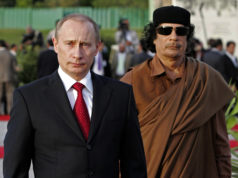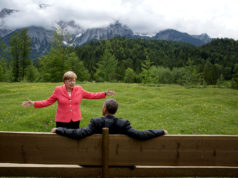As a country that over the years has not received a great deal of international attention, Tunisia found itself in 2011 catapulted to center stage. The first Arab nation to overthrow its authoritarian ruler, Zine el Abidine Ben Ali, Tunisia became a model for what would become known as the “Arab Spring,” offering a blueprint for successfully staging a popular uprising against a detested regime. Western countries were quick to praise and endorse the Tunisian revolution, distancing themselves from the decades of support they extended to Ben Ali. Protestors in Cairo waved the Tunisian flag as they called on President Hosni Mubarak to follow in Ben Ali’s footsteps and quit his position, while demonstrators in Yemen were overheard shouting “Tunisia is the Solution” as they demanded the removal of their president from power.
Notwithstanding the fact that Tunisia was the first to experience a revolution, and was a source of inspiration for other popular uprisings across the Middle East and North Africa this past year, the Tunisian experience of 2011 is ultimately a reflection of deeper, historic developments unique to Tunisian politics and society. Indeed, as countries throughout the region continue on the complicated path towards a new political and social system, much of the recorded events and developments underscore deep-rooted rifts and tensions in each respective country. These include internal tribal, ethnic, and sectarian divides; the continued involvement of the military such as in Egypt; and a general lack of political stability that has underpinned public life in places like Libya or Yemen. These impediments may ultimately threaten the entire process of constitutional and political reconstruction in these countries, making a democratic outcome in each of them far from inevitable. Tunisia, as a country that managed to weather these obstacles relatively well, may serve more as an exception to the “Arab Spring” in its ability to move forward, while other countries remain mired in domestic turmoil, locked in internal struggles.
Revolution Amongst Stability
A statistical profile of Tunisia reveals many of its special features and qualities. A small country by regional standards (pop. 10.5 million), Tunisia’s demographic growth has been slowed thanks to an ambitious national family planning program adopted in the 1960s. Women in Tunisia are fully integrated into politics and society. Literacy rates are high, and a growing number of Tunisians are university educated. Although Tunisia is not a rich oil-exporting country and lacks other natural resources, it has managed over the years to build a solid middle class and reduce poverty. While this middle class may not be the socio-economic equivalent of a Western society middle class, it serves as the backbone of Tunisian society and plays a key role in its development. Tunisia’s tourist industry is a leading source of income, welcoming in the past over 6 million tourists annually. This large number of foreign tourists reflects Tunisia’s openness to the world, which naturally affects the country’s foreign policies.
Politically, Tunisia has traditionally adopted moderate, pro-Western positions on regional and international issues. One crucial feature of Tunisian public life that underpins much of its political history is stability. Tunisian society has historically clung to domestic stability, largely refraining from embracing radical ideologies or adopting violent tactics in order to achieve political goals. Unlike other countries in the region, it did not experience numerous military coups or become entangled in nurturing ideas such as Arab nationalism, which frequently ended up being a destructive political force. Since obtaining independence from France in 1956, it has only been ruled by two leaders, Habib Bourguiba, known as Tunisia’s founding father, and Ben Ali who ousted Bourguiba, then in failing health, in a bloodless coup in 1987. Tunisia also has a rich history of political and social activism, starting from pre-colonial era efforts to implement a constitution in the 1860s through its later nationalist struggle against French colonial rule, and the establishment of strong social frameworks such as the leading trade union (UGTT), which commanded an important role in Tunisian society in the early, post-independence years.
These features of much vaunted stability, supported by a large middle class less interested in radical politics, would make Tunisia an unlikely candidate for a popular uprising. For many years, this tableau was frequently invoked by observers and commentators at home and abroad as an explanation for the apparent stagnation in Tunisian politics. The last year has significantly altered that perception. The events that led up to the Tunisian revolution of early 2011 are by now well known. Against a recognized backdrop of increasing economic difficulties, rising unemployment (particularly among young university graduates), and growing public resentment of an unyielding authoritarian regime further tarnished by corruption allegations—all that was needed was a spark to ignite widespread protests. The publicized story of Mohammed Bouazizi, a young unemployed Tunisian who immolated himself in December 2010, was the trigger that unleashed unprecedented demonstrations in many parts of the country. Without presenting a full account of these events here, it is important to note that the leading activists behind these protests were trade union officials and other veteran social activists. These groups proved to be far more viable than many had previously presumed, and stepped up to assume a leading role as the protests against the government and in support of Bouazizi got under way. The anti-Ben Ali protests, contrary to an image that gained traction around the world, were not led by unknown, young individuals seizing an opportunity to voice their frustrations with the help of social media networks. When given the opportunity, Tunisia’s veteran structures (and not necessarily new activists without any previous involvement in politics) were the ones who played a pivotal role in the protests, which led to the stunning announcement on January 14, 2011 that Ben Ali had fled the country and received asylum in Saudi Arabia. For Tunisia, a new era had begun.
Tunisia’s Political Traditions
The events that followed Ben Ali’s departure reflect many of the historic features that have underpinned Tunisia’s public life. Indeed, one conclusion that can be drawn from this past year’s events in the Middle East and North Africa is that it is far too early to dismiss any country’s political traditions. As tempting as it may be to proclaim that the region is on the cusp of embracing a new, more pluralist and democratic oriented political culture, developments on the ground suggest how difficult it is to uproot established mores overnight. Such is the case in Egypt, for example, where the military establishment has maintained its grip on power despite the removal of Hosni Mubarak from his position. In Tunisia, political traditions have proven to be more helpful in the aftermath of Ben Ali’s flight, underscoring the exceptional qualities that fashion Tunisian politics.
As the international spotlight shifted away from Tunisia to Egypt and Libya, Tunisians set out to rebuild their political system and prepare for open, democratic elections. Compared to the fate of other countries in the region, the aftermath of Tunisia’s revolution has been far more positive. Within nine months, Tunisia managed to establish an interim government, prepare and hold elections for a Constituent Assembly, and absorb new and old political forces into the political stream. These achievements reflect, more than anything else, Tunisian exceptionalism, in comparison with other countries that lack Tunisia’s political tradition. The quest for stability in Tunisian society paved the way for the establishment of an interim government, which initially included members of Ben Ali’s cabinet. The small, largely ineffective “legal” opposition parties that operated in Tunisia during the Ben Ali years justified this to their supporters, contending that they had no actual experience in state affairs and that some members of the previous regime were needed in order to manage the daily workings of the government. Nevertheless, the interim government was reshuffled shortly afterwards as part of an effort to dismantle the mechanisms of the Ben Ali regime and establish new frameworks instead.
One important agency that helped orient Tunisia over the past year was the High Commission for the Fulfillment of Revolutionary Goals, Political Reform, and Democratic Transition. The 150 members of this commission were not elected, but represented political parties and civil society organizations which cooperated together in an effort to reach a consensus on key issues pertaining to Tunisia’s political and constitutional future. Although the commission’s work was not bereft of tensions and rivalries between its members, the very fact that such an institution was able to function successfully underscores the unique features of Tunisian public life. The possibility of such a commission organizing successful elections in a relatively short time period seems highly unlikely in Libya and Yemen. Although Egypt has held parliamentary elections, the vote there is far more contested than in Tunisia, and may not be the remedy to the country’s political ailments.
An Islamist Resurgence?
Tunisia passed the milestone of organizing open, free elections for a Constituent Assembly in October 2011. This assembly is a transitional body responsible for writing a new constitution and preparing for presidential/parliamentary elections once the nature of the country’s future political framework is determined. Overshadowing these developments has been the resurgence of Tunisia’s Islamist Ennahda (Renaissance) movement, which is inspired by the Muslim Brotherhood and other political Islamic movements and has emerged in recent months as the leading political force in the country. Ennahda’s prominence is a source of concern for its opponents, who fear that the movement seeks to undermine the country’s pro-Western orientation and steer Tunisia towards a more radical position.
Ennahda is not a newcomer to Tunisian society. Its activities date back to the 1980s, when it emerged as a vocal opposition force against the regime and was embraced by many Tunisians who opposed the government, disapproving of the regime’s pro-Western orientation. In that sense, Ennahda does not differ from similar movements across the region. The movement has argued that it is not a radical, anti-democratic force. Its leaders have claimed over the years that Ennahda’s main goal is to impart “traditional values” in Tunisia. After an initial period of tolerance towards Ennahda, Ben Ali imposed a brutal crackdown against the movement’s leadership and activists in 1991, arguing that the movement had plotted against the regime. Ennahda’s leader, Rachid al-Ghannouchi, fled to exile in London, while the movement was effectively removed from Tunisian public life. The end of the Ben Ali era marked the movement’s revival. Ghannouchi returned from exile, and Ennahda activists quickly established an impressive grass roots network across the country after the movement was legalized in March 2011. The new era, however, was different for Ennahda. With Ben Ali gone, the movement lost its opposition luster and was now forced to present the Tunisian public, and more specifically its voters, a constructive platform that offered tangible solutions to the country’s socio-economic woes.
From the outcome of the October 23 elections, it seems that many Tunisians endorsed Ennahda’s positions. The party became the largest party elected to the Constituent Assembly, and formed a government with two other (non-religious) parties. Indeed, Tunisian voters interviewed after casting their ballots noted that they voted for Ennahda less for its religious orientation and more for it being a party untarnished by any previous association with the Ben Ali regime. For its part, Ennahda has gone out of its way to allay concerns about its future policies. Ghannouchi and other leaders have pledged not to undermine, for example, the position of women in Tunisia, and contend that they are not radical figures. Although Ghannouchi has over the years declared many offensive critical statements against the West and Israel, it is truly too early to tell whether Ennahda will indeed lead Tunisia on a more radical path.
The Exception
The events of the past year put Tunisia on the map. While the small North African state may prove to be a model for other “Arab Spring” countries, the existence of a pivotal moderate middle class in Tunisia keen on maintaining stability and adhering to the country’s moderate traditions suggest that even when it comes to political Islam, Tunisia could possibly remain an exception in an otherwise chaotic, unstable region.
Daniel Zisenwine is a research fellow at the Moshe Dayan Center for Middle Eastern and African Studies at Tel Aviv University.





